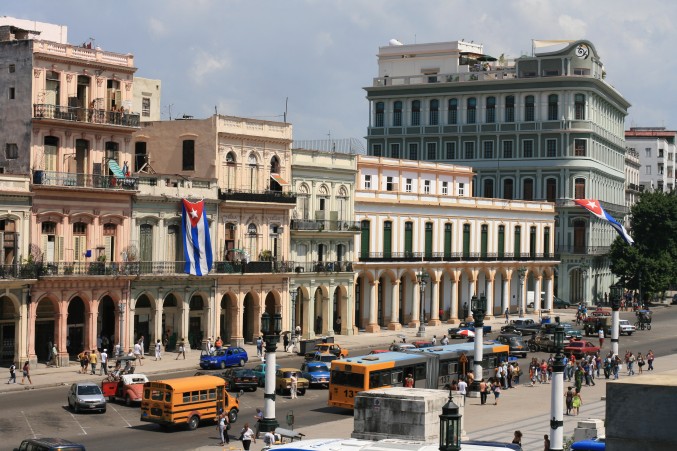
Jonathan Blue: ‘Things have just snowballed’ in Cuba
Seven years ago, Louisville investor Jonathan Blue started getting interested in Cuban art. Seven months ago, he had little more than a hunch it would become a major new investment opportunity for his private equity firm, Blue Equity.
But that all changed in December, when President Barack Obama announced his administration would begin to normalize relations with the island nation after 54 years of a strict economic and cultural embargo. And while restrictions on trade remain in place, the administration has sent signals it may soon ease them further, including removing Cuba from the terrorism watch list.

For Blue, it’s an opportunity to begin exploring enhanced trade through business contacts he’s made there after numerous trips to explore Cuban art and culture. He set up a Cuba team at Blue Equity and today, three people are researching opportunities in the country of 11 million people. He is now traveling there regularly in search of market openings, of which there will be many, he said.
“Things have just snowballed,” Blue said, speaking with IL in his downtown office on a recent evening.
It’s important to put the snowball in context. As it stands, U.S. companies can only explore new business with the Cuban government in certain areas, among them telecommunications, agriculture, tourism and infrastructure. So when Blue goes to Cuba to meet with contacts, his avenues for exploration are pretty narrow. He’s never been to the beach there, for example.
Not only that, it’s far from a given that Cuban consumers — who have for years seen the fruits of normalized trade with other major partners, such as Brazil, China and Canada — will jump at U.S. products.
“This is not Dubai just 90 miles south of the U.S., saying, ‘Please sell us your products,’” John Kavulich, president of the nonprofit advisory group U.S.-Cuba Trade and Economic Council, told CNBC last month.
Still, Blue said the countries trading with Cuba now are reaping benefits that the U.S. — situated a mere 90 miles away — should at least be party to. Famously, of course, there are no post-Castro American cars in Cuba. Nor is there heavy machinery.
“They’re getting the per capita growth — they, those foreign countries,” Blue said. “I don’t want to say they’re laughing at us, but the irony is, we’re the closest one. In difficult economic times, let’s take advantage of a 12 million-strong population.”
Nobody is quite sure what that will look like. Asked what the key trading areas could be out of the gate, Blue mentioned bourbon and American beers, Kentucky agriculture products, and the high-tech logistics and distribution industry for which Louisville is nationally known.
“If we can apply those principles down there — and be the first one — we have a niche that’s 80 to 90 miles away, whereas everybody else is coming from, say, the South Pacific, that’s a lot of trade route versus off the coast of Texas or off the coast of Florida,” he said.
In recent years, both city and state governments have focused economic development efforts on increasing exports. Kentucky exports hit a record level in 2014, with $27.5 billion worth of goods flowing out of the commonwealth to 191 countries. Mayor Greg Fischer and Lexington Mayor Jim Gray also have partnered to form the BEAM Initiative, which is focused on promoting new exports in a 22-county region.
Neither the state nor Metro government has imminent plans to explore Cuban trade. However, Fischer said he’s open to it.
“Jonathan and I have been discussing Cuba — and I believe there could be interesting opportunities for us to explore,” Fischer said.
Mary Ellen Wiederwohl, chief of Louisville Forward, the city’s economic development arm, told IL that while Cuba is still an “early-stage proposition,” it’s also an interesting one.
“We’re watching it with great intrigue,” she said. “We have our ongoing export initiative, where we’re helping small- and medium-sized enterprises increase their exporting capacity. One of the big goals in that is to help them export to new countries.”
Blue said he would like to see Beshear and Fischer head a trade exploration mission to Cuba in the near future. When New York Gov. Andrew Cuomo visited the country last month, for example, he returned with two trade deals in hand — and left an impression that enhanced trade could also mean holding Cuba accountable for human rights violations. Earlier this month, JetBlue announced it would begin a direct flight from New York City to Havana.
Blue said he expects the opening of Cuba to U.S. trading partners will be slow and staggered, but that over time, Kentucky could be in a unique position to benefit.
“The key is to make friends and have contacts, which we’re allowed to do, and be ready to pounce,” he said. He’s already there.
(From: Insider Louisville)


